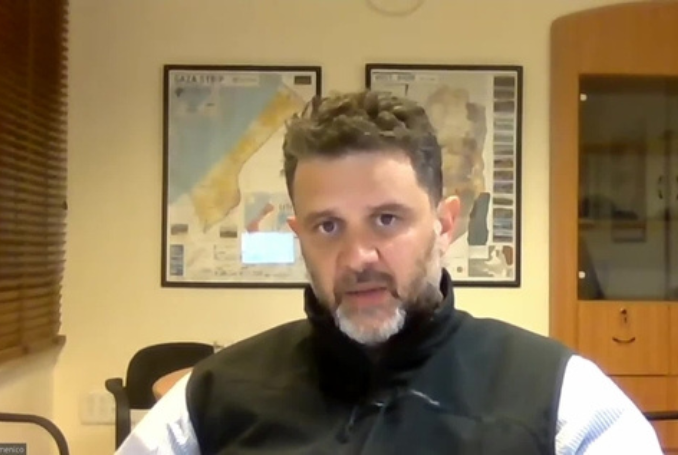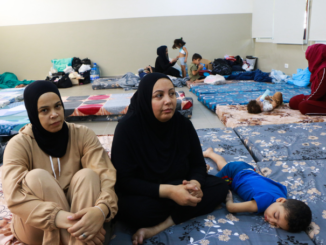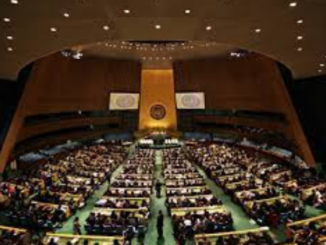
“I think there is no other place in the world where the system has been put to such level of challenges and stretch”.
The head of the UN’s Office for the Coordination of Humanitarian Affairs (OCHA) in the occupied Palestinian Territory has said “the idea of extending this (Gaza) war for another six months or seven months is simply terrible.”
Addressing journalists during a virtual press briefing from Jerusalem, Andrea De Domenico, highlighted the impact of the Israeli invasion of Rafah since May 6, “with the subsequent move (of) up to almost a million people that found refuge for months in Rafah,” and being forced to move again suddenly.
“The result of it is that the narrowing space that is left for civilians to conglomerate and leave is becoming more and more limited, and more and more crowded,” De Domenico stressed.
He pointed out that within the tents, it is “so hot during the day, and of course there is lack of water for people within the tents. And so, people basically are going to the sea to find some opportunity to cool themselves down because of the high temperature of the day.”
Eroding Civil Fabric
The people of Gaza, De Domenico said, are “very welcoming people, they’re super they’re formidable guests,” but the dire situation on the ground is destroying “more and more this fabric progressively.”
“The rule of the strongest is becoming the only rule that is prevailing simply because there is so little for people to survive that only the strongest can have access to that, and that has eroded and penetrated even the relations within family members.”
The UN official also stressed that all hospitals in Rafah are “no more functional” and that only field hospitals remain.
With “more or less 950,000 people” left Rafah, he said “the operational environment remains extremely challenging” in the area.
End of May in #Gaza:
? More than 1 million people – most displaced several times- forced to flee once again, in search of safety that they never find.
?All of our 36 @UNRWA shelters in #Rafah are empty now. This is where people seek shelter & should be protected at all times… pic.twitter.com/kcukoLU1XP— Philippe Lazzarini (@UNLazzarini) June 1, 2024
De Domenico estimated “more or less there are 20,000 pregnant women that will again lose any point of reference for bringing their pregnancy to an end in conditions that are suitable for, and adequate for a proper delivery for their babies.”
Challenging Levels
On remarks by Israeli officials suggesting the genocidal war in Gaza will continue until the end of the year, De Domenico said such an idea was “simply terrible.”
“I was reflecting a little bit on all this dynamic of the criticism moved to the United Nations’ inability to deliver humanitarian. I’ve lived it on my skin in the last three weeks how complicated it is to operate,” he said. “I think there is no other place in the world where the system has been put to such level of challenges and stretch”.
He said OCHA “will keep on trying and doing our job day in and day out, to the end of our ability. And the concern for me is how people will cope with this.”
As people continue to be forcibly displaced, @UNFPA estimates that around 18,500 pregnant women have fled #Rafah. Around 10,000 more remain there in desperate conditions.
Access to healthcare & maternal supplies is minimal. Mothers' and babies' health is at risk.#CeasefireNow pic.twitter.com/8ZfRljNLUp
— UNRWA (@UNRWA) June 2, 2024
One Million Displaced
More than one million Palestinians have been forced to flee Rafah due to Israel’s ongoing military assault on the enclave, according to the UN Agency for Palestine Refugees (UNRWA).
“Forced displacement has pushed over 1 million people away from Rafah,” UNRWA said on X on Monday. “Thousands of families now shelter in damaged & destroyed facilities in Khan Younis.”
Despite “increasing challenges” the agency said, it “keeps providing essential services” amidst conditions that “are unspeakable.”
Rafah housed more than 1.5 million displaced Palestinians before Israel’s ground invasion began on May 6. Many had already fled their homes in areas across the besieged enclave which was attacked by Israeli forces.
‘Unspeakable Conditions’ – UNRWA Says One Million Forced to Flee Rafah
Over 36,000 Killed
Currently on trial before the International Court of Justice for genocide against Palestinians, Israel has been waging a devastating war on Gaza since October 7.
According to Gaza’s Ministry of Health, 36,550 Palestinians have been killed, and 82,959 wounded in Israel’s ongoing genocide in the enclave. Moreover, at least 11,000 people are unaccounted for, presumed dead under the rubble of their homes throughout the Strip.
Palestinian and international organizations say that the majority of those killed and wounded are women and children.
The Israeli war has resulted in an acute famine, mostly in northern Gaza, resulting in the death of many Palestinians, mostly children.
The Israeli aggression has also resulted in the forceful displacement of nearly two million people from all over the Gaza Strip, with the vast majority of the displaced forced into the densely crowded southern city of Rafah near the border with Egypt – in what has become Palestine’s largest mass exodus since the 1948 Nakba.
Israel says that 1,200 soldiers and civilians were killed during the Al-Aqsa Flood Operation on October 7. Israeli media published reports suggesting that many Israelis were killed on that day by ‘friendly fire’.
(PC, Anadolu)









